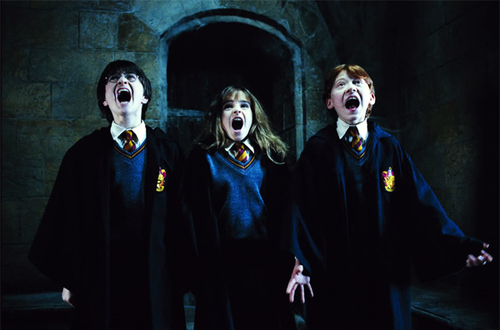 |
| Their reactions, if they'd known then what puberty had in store. (Image credit) |
I do like love triangles -- sometimes. Everything in moderation. I've read plenty of books that don't have a love triangle, too. But Eternity had a love triangle, even though the main character tries to pretend it doesn't exist. The Lord of Opium also ended up having one, albeit a very unusual one. I'm also really hesitant to read Throne of Glass because I know there's a love triangle in that as well, and it plays a central part in the story.
Even Fire and Hemlock had a sort-of love triangle. More like a love Twister. That one was weird.
The love triangles I see most often are:
- Girl torn between obvious right choice and bad boy. The girl usually has some kind of savior complex that makes her fall for the bad boy, hoping she can "fix" him, often later to realize that she needs saving by the "good" boy.
- Two men fighting over the same woman, whether or not the woman knows about it or likes either of them. If she does know about the rivalry, she'll usually be turned on and flattered by the conflict (a Bella Swan). Otherwise, she'll try to keep the peace between them (a Hermione). More rarely, the girl has no clue, either because she thinks of both of them as friends or because she's completely in love with one of them (like Em from Eternity).
Sigh again.
By no means do I hate any of these books for having love triangles. I think I understand why it's such a popular device. It creates quick and easy conflict and is a way to develop character. It can also elevate the "other woman" or the "best guy friend" character into a more interesting character. If characters don't have any other issues with each other, introducing romantic conflict is a good way to start a subplot. Love triangles also get fans really involved by rooting for the pairing they support.
Because of all these things, the love triangle sees a lot of use. In fact, it sees so much use that it's practically a cliche by now. When I run across a love triangle in a book that is not a romance novel, my automatic reaction has become:
"Another love triangle? Really?"
I'll still read the book. Sometimes the love triangle is executed in a fresh, original way that surprises me. Sometimes.
Sigh.
I did read Harry Potter, but other than that I can't think of a novel off the top of my head that featured a love triangle. I may have read one though. (Though I suppose if I have forgotten it, it wasn't much of a novel..or much of a love triangle.)
ReplyDeleteNot having read the other books you mentioned, and stipulating that a great book can be far more than said triangle, I will say that I probably wouldn't read a book that i knew had one it it. Even less so a book that is billed as being about such.
To begin with, it does seem to be a well authors dip into quite frequently lately. I can see how it would inject conflict and character development, as you mentioned, and I suppose it's better to have that than to have no conflict. But for me even when the characters are strong, triangles as a human experience seem somewhat pathetic to me. But then again that could just be because I have never tried to compete within one myself.
Part of me says that no matter who is in the middle needs to just make a decision already, even if that decision is to tell both suitors to give some space already. Actually I would love to see a triangle where the one in the middle wanted someone outside of the triangle, and left both hanging.
The insistence that the character "choose" always annoys me. Usually if it's gotten to that point, the behavior of the other corners of the triangle (usually men) have gotten so obnoxious and unlikeable in their competition that the middle person would be well within their rights to tell them both to get lost.
DeleteIn YA, it's become a sort of shorthand for teen romantic angst. I personally think that there are better ways to do that.